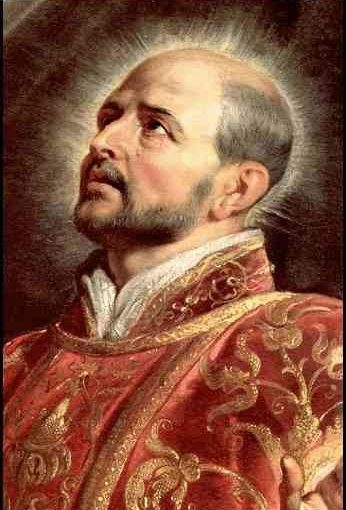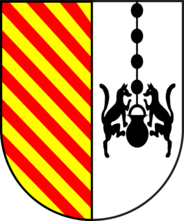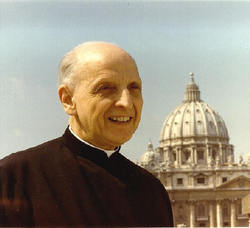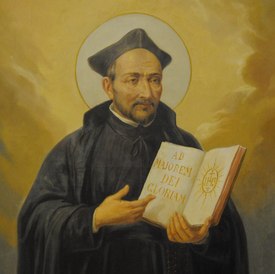“God freely created us so that we might know, love, and serve him in this life and be happy with him forever. God’s purpose in creating us is to draw forth from us a response of love and service here on earth, so that we may attain our goal of everlasting happiness with him in heaven. All the things in this world are gifts of God, created for us, to be the means by which we can come to know him better, love him more surely, and serve him more faithfully.”
—St. Ignatius Loyola
Category: Ignatian Spirituality
Do you aim for heaven?
We must aim at heaven with all our strength. Man will have to re-learn, much more positively and intensively than before, that life leads from the personal dialogue with God to the actual personal encounter and the experience of unity with God.
He will have to learn that this is his heaven and his real, his only, home. Then he will learn to pray, not merely as a duty and in obedience, but with intense vitality and with all the driving force of his own free will.
The Prison Meditations of Alfred Delp
Fr. Alfred Delp, SJ
Sacred Story renews interest in spiritual discernment
The notion of spiritual discernment is not new to the spiritual life of Catholics. It has been part of our spiritual heritage for a very long time. Discernment is the key way we judge reality as it exists, and how I am a protagonist in this reality. One of the spiritual masters of the contemplative life is Saint Ignatius of Loyola who, as you know, placed great emphasis on spiritual discernment. This is seen in his classic manner of leading persons to a deeper relationship with Jesus Christ in what is known as the Spiritual Exercises as lived in the 30-day silent retreat, or the 8-day retreat or some shorter form of retreat. The Exercises is more of an experience of grace than a text; it is a method, a journey rather a destination; discernment means having an experience greater sense of freedom in Christ than a decision maker.
The election of a new Pope, man who has been formed in Jesuit and Ignatian spirituality has consequently brought to us renewed interest in the difficult, exacting and yet rewarding manner of knowing and living God’s will and living in the Divine Presence now. We know that our happiness on earth as in heaven has been promised to us by the Lord Jesus himself. You may want to contemplate the biblical narrative of the hundredfold to see what Christ indicates.
The other night on EWTN’s program with Father Mitch Pacwa, SJ, a new program, the Sacred Story Institute, was discussed and the conversation gave me a solid impression that what is proposed herein is very much worth our critical attention. Poke around the website (link given above) and you’ll find some interesting and useful stuff. The work of Sacred Story is clearly about the new evangelization but it is more: it is about meeting Jesus personally through the gift of life given to us by God the Father. If the goal is gain more people in the pews, then don’t bother; the spiritual life is not a program. If you want to know Christ in a personal way with the concomitant desire to be His disciple, then look no further.
Here is my recommendation: watch what Jesuit Father William Watson says as he introduces the Sacred Story Institute here. You may want to order a copy of Watson’s book, Forty Weeks: An Ignatian Path to Christ with Sacred Story Prayer. One valid piece of criticism I can offer is it can be perceived to rely on psychology a little too much. Fair enough. There are points in the work that gives the impression that seems to give too much preference to psychology than to spirituality. Perhaps this is a point in further revisions of the text as they do some beta testing.
It seems to me that if you want to be mature Christians, then you ought to take advantage of the work of this Institute.
Matt Malone interviewed on the remaking of America [magazine]
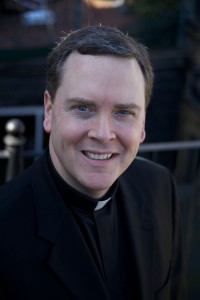 Father Matthew Malone, SJ, was interviewed by Basilian Father Thomas Rosica of Salt + Light TV. Rosica’s very good work in the new evangelization with S+L’s Witness program.
Father Matthew Malone, SJ, was interviewed by Basilian Father Thomas Rosica of Salt + Light TV. Rosica’s very good work in the new evangelization with S+L’s Witness program.
Father Malone speaks about his vocation, his work as the Editor-in-Chief of America magazine –and its remaking, Jesus Christ, the missionary dimension of the Jesuits, Ignatian spirituality, ecclesiology, theological discourse, Truth, and much more.
As Malone rightly says, the Jesuits at America House have a Catholic ministry that bears witness to the Catholic faith published a magazine (since 1909) and a website.
Watch the Malone interview here.
In light of the recent papal election, the Society of Jesus is now in great view to explain the world to the Church and the Church to the world. Rosica draws our awareness of what the Jesuits are meant to be, and how they are
Act of Confidence in God by Saint Claude la Colombière
I am uncertain of the history of this prayer, but Saint Claude does a good job capturing the heart of the matter…
My God, I am so persuaded that You watch over all who hope in You and nothing can be lacking to those who await from You all things, that I have determined to live from now on without any concern, letting go and giving You all of my anxieties.
I will sleep and rest in peace because You, O Lord, and only You, have secured my hope. Men can deprive me of possessions and reputation; illnesses can take away my strength and means to serve You; I myself can lose Your grace because of sin; but I will not lose my hope; I will conserve it until the last instant of my life and all the efforts from demons trying to take it away from me will be useless.
I will sleep and rest in peace. May others expect happiness in their richness and talents; some may lean on the innocence of their lives, or the rigor of their penitence, or above all on the amount of their good works,or the fervor of their prayers.
As for myself Lord, all my confidence is my confidence itself. Because You Lord, only You have secured my hope. No one has been deceived by this confidence. No one who has waited in the Lord has been frustrated in their confidence.
Therefore, I am sure that I will be eternally happy because I firmly hope to be; and because You, Oh, My God, are in Whom I expect all. In You I hope Lord, and never will I be confused. I know very well . . . too well that I am fragile and inconstant, I know well the power of temptations against the most firm virtue; I have seen the stars fall from heaven and columns from the firmament; but none of this can frighten me.
As long as I maintain firm my hope, I will be conserved from all calamities; and I am sure to hope always, because I hope the same in this unchanging hope.
In conclusion, I am sure that I cannot hope in excess in You and that I will receive all that I would have hoped for in You. Therefore, I know You will sustain me on the most rapid and slippery slopes, that You will strengthen me against the assaults and make my weakness triumph
over the most tremendous enemies.I hope You will always love me and I will love you without interruption; to take once and for all my hope as far as it can reach. I hope in You and only in You!
Oh, My Creator! In time and for all eternity. Amen.
Discretion keeps the practice of virtue between extremes
The daily grind of living is only made more fruitful when we take time to use the gifts of the Holy Spirit. While not technically not one of the Seven Gifts of the Holy Spirit, Prudence (a cardinal virtue) is perfected by the Spirit’s energy. How often do we move through our day without giving time to self-awareness, reflection on our “I” in action? The lack of a Trinity-diven examination of conscience in one’s spiritual life is a pitfall many post-moderns fall into. Any person wanting to know more about him or herself needs to spend time, if only 10 minutes a day, in reviewing points of grace and sin in life up to that point of the day while asking for the grace of root-and-branch conversion. For example, it is has been said that a measure of the person today is how he or she uses free time. Discretion is a fruit of the virtue of prudence; ask yourself if you have been sufficiently discrete in your undertakings.
Spiritual infirmities such as tepidity are caused, not only by chills but also by fevers, that is, by excessive zeal. Saint Paul says, let your service be a reasonable service [Rom. 12:1], because he knew the truth of the words of the Psalmist, the king in his might loves justice [99:4], that is, discretion; and what was prefigured in Leviticus, whatsoever sacrifice you offer, you shall season it with salt [2:13]. In the same vein does Saint Bernard speak: the enemy has no more successful ruse for depriving the heart of real charity than to get him to act rashly and not in keeping with spiritual reasonableness. “Nothing in excess,” said the philosopher. And this principle should be our guide even in a matter pertaining to justice itself, as we read in Ecclesiastes, be not over just [7:16]. If one fails to observe this moderation, he will find that good is turned into evil and virtue into vice. He will also learn that many inconveniences follow which are quite contrary to the purpose of the one who so acts.
The first is that God is not really served in the long run, as the horse worn out in the first days does not as a rule finish the journey, and thus it happens that someone must be found to care for it.
Second, gains that are made through such excessive eagerness do not usually endure, as Scripture says, wealth gathered in haste will dwindle [Prov. 13:11]. Not only dwindle, but it may be the cause of a fall: and he that is hasty with his feet shall stumble [Prov. 19:2]; and if he stumbles, the further he falls, the greater the danger for he will not stop until he has reached the bottom of the ladder.
Third, there is the danger of being careless in overloading the vessel. There is danger, of course, in sailing it empty, as it can then be tossed about on the waves of temptation; but there is also danger of so overloading it that it sinks.
Fourth, it can happen that, in crucifying the old man, the new man is also crucified and thus made unable through weakness to practice virtue. Saint Bernard tells us that because of this excess we lose four things: “The body loses the effect of the good work, the soul its devotion, our neighbor good example, and God His honor.” From this we infer that whosoever thus mistreats the living temple of God is guilty of sacrilege. Saint Bernard says that the neighbor is deprived of good example, because the fall of one and the ensuing scandal are a source of scandal to others; and he calls them, in cause at least, disturbers of unity and enemies of peace. The example of such a fall frightens many and makes them tepid in their spiritual progress. In the fallen there is danger of pride and vainglory, since they prefer their own judgment to the judgment of everyone else, usurping what is not their own by setting themselves up as judges in their own cause when the rightful judge is their superior.
Besides these, there are also other disadvantages, such as overloading themselves with weapons which they cannot use, like David with the armor of Saul [1 Sam. 17:38-39]. They apply spurs to a spirited horse rather than the rein. Therefore there is need of discretion on this point to keep the practice of virtue between both extremes. Saint Bernard gives this advice: “Good will is not always to be trusted, but it must be bridled, regulated, especially in beginners,” if one wishes to benefit others without any disadvantage to himself, for he that is evil to himself, to whom will he be good? [Sir. 14:5].
Saint Ignatius of Loyola
Letter to the Fathers and Brothers studying in Coimbra, Portugal
May 7, 1547
The Magis according to St Ignatius of Loyola
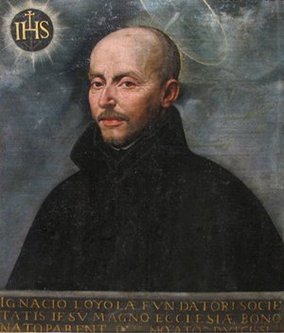 An often confused issue in Ignatian spirituality as it is formulated by Saint Ignatius of Loyola is the concept of the magis. It can be an elusive but central Ignatian idea. But it doesn’t have to be such. Many writers on Ignatian spirituality say that the magis means the best, the highest, the most that we can do for God. But these writers miss the point because Ignatius doesn’t speak in superlative terms.
An often confused issue in Ignatian spirituality as it is formulated by Saint Ignatius of Loyola is the concept of the magis. It can be an elusive but central Ignatian idea. But it doesn’t have to be such. Many writers on Ignatian spirituality say that the magis means the best, the highest, the most that we can do for God. But these writers miss the point because Ignatius doesn’t speak in superlative terms.
The recently departed Jesuit Father Dave Fleming contests this understanding. According to Fleming, the magis is comparative not superlative. That is, it is the more, not the most. Holy Father Saint Ignatius meant the magis to be interpreted and thus lived in view of the greater not the greatest.
Father Dave wrote: “Ignatius never works with superlatives.” Fleming explains, “When we want to do the best, we may get frozen. If we want to do what might be better, we might be able to choose.” Thus, there is an emphasis on freedom in this more authentic interpretation of Ignatius than what one gets with using superlative language. Hence, the magis as a comparative applies to everything, not just a select point or two of one’s life. Everything. A complete and sincere gift of self to God, and then to neighbor.
Pedro Arrupe documentary
The film, Pedro Arrupe: His Life and Legacy, was produced in 2008 by Georgetown University and features rare footage of Father Pedro Arrupe and interviews with his closest advisers.
Father Arrupe was the 28th superior general of the Society of Jesus, from 1965-1983. Born in Bilbao, Spain in 1907, he studied medicine prior to entering the Jesuit order. Before his service as superior general, he served as Japan’s first Jesuit provincial; but a defining moment in Arrupe’s life was his work caring for the victims of the Hiroshima’s atomic bomb. He died in Rome on February 5, 1991, after suffering the effects of a debilitating effects of a stroke on August 7, 1981 just as his airplane landed from an exhausting trip to the Far East. He was succeeded as Father General of the Society by Father Peter Hans Kolvenbach.
Father Arrupe’s writings are some of the best works on Ignatian spirituality there is. One memorable piece is his reflection on the Sacred Heart of Jesus. Before Father Kolvenbach was elected general Father Arrupe’s prayer was read to the elected delegates of the 33rd General Congregation, marking his true identity of being totally free to do God’s will: “More than ever I find myself in the hands of God. This is what I have wanted all my life from my youth. But now there is a difference; the initiative is entirely with God. It is indeed a profound spiritual experience to know and feel myself so totally in God’s hands.”
This five-part documentary on Father Pedro Arrupe, SJ, is now available online on the Jesuit Channel, which is sponsored by the Association of Jesuit Colleges and Universities.
the Greater Glory of God is our measure
” . . . the glory of God is assumed fully, without limits and determinations . . . For us, the glory of God, being our end in all its breadth, is the measure of the quest for our own salvation and perfection,
as well as for that of others.” ~Achille Gagliardi, S.J.
Leading the soul to God by the method of the Ignatian Spiritual Exercises
I came across this entry in an old encyclopedia. In its brevity a lot of truth is revealed: we can work (asceticism) by reason, and the heart, to union with God. Consider for a second what the author, Fr Drum, has to teach. Also, remember that Ignatian spirituality is not the same as Jesuit spirituality. The two are not the same by any stretch of the imagination. Fr Drum tells us that it is possible through prayer and good spiritual direction to know, love and serve God in this world so as to do the same in the next. Many people today don’t have the confidence that knowing and loving and serving God is possible at all. Some don’t know that God wants our happiness today –in this life–that there is meaning to our life that includes suffering and love (& joy) and some reject the notion that we are oriented toward a final goal. Christians call this goal heaven, the Beatific vision, communion with the Trinity, etc. What else is there for the Christian who really prays and lives his or her life with the Gospel and with reason? I get the sense that they don’t have the certainty that God knows us personally and intimately, never mind having a relationship with bodiless being.
I spent many years being formed by Ignatian Spirituality. My personal, cultural, ecclesial life (taken as a unity) is informed by what Saint Ignatius of Loyola proposed in his Spiritual Exercises. But I would not be telling the whole truth if I didn’t say that other influences have had a strong influence in how I look at my life and life’s work today. My life intersects with Monsignor Luigi Giussani, Chiara Lubich, Saint Josemaria Escriva, Saints Francis & Dominic and Saint Benedict and this school of the Lord’s service. The host of women saints and blesseds are too cumbersome to note here. The point, however, is not my interpretative lens except to say that I have benefited from the Spiritual Exercises and perhaps you might think the same if you gave the Exercises a chance. They are clearly an apostolic method in the spiritual life with an incredibly strong contemplative aspect. The Exercises are not for everyone, so be patient with them if you attempt to do an Ignatian retreat.
Ultimately, what the author of this entry names as the goal of the Christian life is my own, regardless of the influences: To live is Christ. It is entirely consistent with the motto of my coat of arms seen above: sequela Christi (to follow Christ). Ignatius (and the other spiritual masters noted above) could not conceive of life any differently. Would that be the same for all people!
The entry:
The spirit of Saint Ignatius was Pauline, — intrepid yet tender; motivated by two great principles,–love of Jesus Christ and zeal for the salvation of souls. These two principles were brought together in his motto: A. M. D. G., “Omnia ad Majorem Dei Gloriam” (All for the greater glory of God). It was this spirit, which breathed in “The Spiritual Exercises,” a method of asceticism, that is the very soul of the constitutions and activities of the Society of Jesus.
This little book is said to have converted more souls than it contains letters.
Certainly the results it has produced down the centuries cannot be exaggerated. The importance of its method is proved by the mere fact that 292 Jesuit writers have commented on the whole work. The purpose of the Exercises is definite and scientific upbuilding of the reason, will and emotions, by meditation and contemplation on the fundamental principles of the spiritual life and by other exercises of the soul. First, God is rated rightly as the soul’s end and object.
Reason is convinced that God is the end for which the soul is created, and all things else are only means to bring the soul to God; hence it follows that that is good which leads the soul Godward, and that is evil which leads the soul awayward from God.
The soul’s awaywardness from God results in sin; so sin is studied both in itself and in its consequences to the soul. Secondly, Jesus Christ is put in His place in the soul, by meditations on His ideals and contemplations on His private and public life.
The soul now aspires to the very height of enthusiastic and personal love to Him; and to the most self-sacrificing generosity in following the evangelical counsels.
Thirdly, the high resolves of the soul are confirmed by the imitation of Christ in His passion. Lastly, the soul rises to a sublime and unselfish joy, purely because of the glory of its risen Lord; and leaps with rapturous exultation into the realms of unselfish and perfect love of God, such as Saint Paul evinced when he cried out: “To me, to live is Christ; to die were gain” (Philippians 1, 21).
Fr Walter Drum, SJ
The Encyclopedia Americana, 1919
